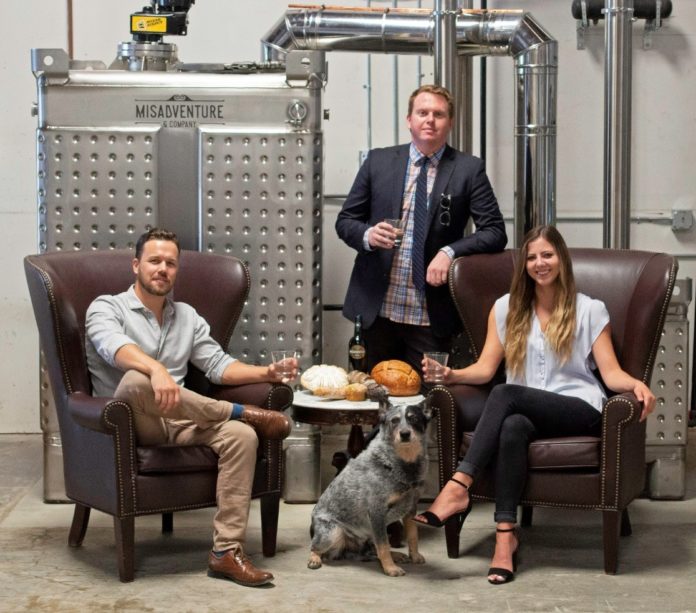In 2013, a chance meeting between Whit Rigali and Samuel Chereskin in a North County bar would forever change their career paths, one that would lead to sustainable spirits. Here’s the rest of the story: Rigali, the bartender, wanted to create local craft spirits for other bartenders to use. Chereskin, an agricultural economist, wanted to find ways to improve food systems and show that doing good can also be viable. Their conversation over a glass of whiskey led to the creation of Vista-Calif.-based Misadventure & Co, which officially opened in September 2019 after six years of R&D.

“At that time in San Diego, all anyone was talking about was craft beer,” Rigali said. “Sam and I were some of the few oddballs who wanted to make spirits. Some mutual friends overheard me talking about my interest in spirits, and they introduced me to Sam while I was bartending at the Compass in Carlsbad. We talked about our dreams of making our own whiskey over a couple glasses of bourbon. Next thing you know we were doing experiments in a garage.”
Those experiments were plentiful. In fact, Rigali describes those early R&D days as a “hot mess.” He gives the low-down on how he and Chereskin finally came up with the perfect batch and what led them to upcycled vodka.
“We always wanted to be a sustainable distillery,” he said. “But at the time, there weren’t a lot of options available to us. In the beginning, we tried putting whiskey in reused wine bottles. That turned out to be a bigger project than we could afford, but it taught us that our zany ideas were possible and that if we truly wanted to be sustainable we had to do it ourselves.”
So in 2016, the entrepreneurs began to look for spirits that take seven-to-10 days to make. During that time, Rigali recalled, the Natural Resource Defense Council came out with a study stating that nearly 40% of all food produced globally ends up uneaten in a landfill. “The tragedy of that is not only are the resources used to produce these foods wasted, (i.e. 25% of our drinking water goes into the foods we don’t eat) but once food ends up in a landfill it produces methane, which is 25 times more potent as a greenhouse gas than CO2,” he said.

Instead of looking at these products (baked goods) as simply “food” or “waste,” Rigali and Chereskin looked at them through a distiller’s lens and saw what they were made of starches and sugars, which are the building blocks to making all alcoholic beverages. That realization was the lightbulb moment that led Misadventure to being the first distillery in the world to make high quality vodka from excess baked goods.
“An environmental impact study conducted by the University of Michigan concluded that by using surplus food as our input, we offset more carbon than it takes to produce our vodka,” Rigali said. “That means we are the first carbon negative spirit in the world, which also means that when someone sips on Misadventure vodka they are actually lowering their carbon footprint.”
Misadventure currently partners with nonprofits such as the San Diego Food Bank, Produce Good, and the Oceanside Kitchen Collaborative. “We are constantly trying to find new ways of upcycling excess food, and now we have a place to experiment with cocktails in our private event space,” Rigali said.
“When we first began, we were just learning the art of distillation,” he added. “We got started on over 50 different experiments – playing with the grain bills, yeasts, enzymes, temperature hold times, etc…. After a while, we were able to work with other distillers at their facilities and refine our process even more. Things got really interesting when we began experimenting with baked goods. No one had ever done it before, so we had to invent our own processes. The first roadblock was trying to separate the baked goods from their packages, which isn’t a problem at home but gets out of hand when you’re dealing with 600 pounds at a time. We’d spend days in the garage with straw hats, giant pizza knives and beers, slicing through the packages. What was unknown to us at the time was that the San Diego Food Bank already had a machine capable of separating food from its packages on a massive scale. So now we pick up the baked goods already processed into crumbs.”

Misadventure’s pioneering sustainable methods have not gone unnoticed. In fact, distilleries across the country are integrating environmentally-friendly practices and exploring how to make their supply chains more sustainable.
“This is a global trend affecting every industry,” Rigali said. “Climate change is not a fad. There are real world consequences unfolding before our eyes. We have to live symbiotically with the environment. This means rethinking how our products are made, transported, packaged, used, and ultimately disposed of. For those with the right perspective, this is the ultimate economic opportunity.”
Speaking of economics, the $44 billion U.S. spirits market is expected to grow 6% per year through 2022. Meanwhile, the U.S. craft spirits market is expected to reach revenues of more than $20 billion by 2023, growing at an impressive CAGR of over 32% between 2018 and 2023.
Misadventure is sure to grab a piece of that market. While the basic techniques for distillation have stayed fairly constant for the last century, Misadventure is changing the game in spirit making. Besides creative sustainability, the Vista distillery has also created new processes, equipment, and organizational perspectives that are disrupting both the vodka and excess food markets.
For example, Misadventure’s brewing and fermentation technique, which is proprietary, uses a bio-mimicry based approach to make sure the energy-rich breads and pastries it uses are bio-available to be turned into ethanol. The company even designed its own still (the apparatus that makes distilled spirits), which, Rigali said, has the distinct advantage of being able to produce large amounts of vodka in a compact design.
“This is essential for two reasons: vodka is difficult for most stills to produce (ultra-high purity alcohol requires a super-efficient design), and high volumes of pure alcohol require multi-story (height) pieces of equipment. Misadventure creates vodka at volume while still fitting into a premises that is leased,” he explained.
“From an organizational perspective, an investment office from the largest distilling company in the world said that our model of making spirits from excess baked goods gives the first reason for the urban distillery to exist due to our ingredients from retailers and food banks rather than directly from farms,” Rigali added.

Rigali and Cherskin chose Misadventure’s “urban” locale, Vista, partly due to the city’s plethora of makers, organic farms, breweries and hopping industrial park, Oak Ridge Business Center.
“From day one we knew we wanted to be in Vista. We wanted to be around other makers, and the industrial park here is a hotbed of activity with established companies and start-ups,” Rigali said. “Plus, the city is very accommodating to new businesses and there’s already a population excited about trying new beverages, thanks to the craft brewers. We’ve already worked with some of the great Vista farmers and look forward to partnering with anyone who’s interested in using their excess resources in different ways.”
He added that the City’s staff has also been proactive in helping Misadventure with its business needs. “Every city staff member that our new business has interacted with has been attentive, proactive and a pleasure to work with. We were able to get through our tenant improvement in less than six months. The city has been very helpful in connecting us with other businesses and potential customers now that we’re open for business.”
In an effort to spread the word about its new business as well as bring more foot traffic through Vista, Misadventure also offers tours at its distillery.
“I’ve found that consumers know a heck of a lot about beer and wine but have not had the chance to learn more about spirits,” Rigali said. “The purpose of the tours is to educate those interested in spirits and sustainability and have some fun along the way. We hope to add to what is already a one-of-a-kind area. Once someone visits us we can’t wait to show them what the rest of the industrial park has to offer. There’s great music at Aztec Brewing Co., and games at BattleMage Brewing and Twisted Horn. I saw a paint and wine night at 2 Plank. Someone could spend an entire weekend here, stay at one of our local hotels and barely touch all there is to offer.”
For Kevin Ham, Vista’s Economic Development Director who has worked with the team since their early years, Misadventure adds to the city’s already robust craft industry while creating local jobs and bringing more innovation to the region.
“We are excited to welcome Misadventure to Vista and we applaud the distillery for reducing its carbon footprint and encouraging others to do the same,” Ham said. “Attracting innovative companies like Misadventure also adds to the City’s diverse industry-base and creative culture.”
Creativity is definitely part of Misadventure’s M.O. In fact, Chereskin, whom Rigali calls “our resident renaissance man,” designed or custom built nearly everything at the distillery. There’s even a DIY CNC machine that he built to cut some of the unique lanterns and signs in the private event space.
Chereskin, who was born in Encinitas, is an alum of the University of Chicago, and has a background in agricultural economics. Studying food systems in Sub Saharan Africa gave him an intimate knowledge of how food is grown, transported, and disposed of.
Meanwhile, Ragali, who has a background in fine arts, grew up in Western Massachusetts. “My family would throw these small neighborhood parties every year that eventually grew to a few hundred people showing up to our house for mud wrestling, egg tosses, hot air balloon rides, etc..” he said. “Today I still enjoy creating spaces that make people come together and be happy.”
As he looks back at all the “misadventures” over the last few years, Rigali revels in the meaning of the distillery’s name.
“The name has many meanings. To make this product, we had to make our own equipment and learn by doing and mostly failing – there were floods, cuts, broken bones, electric mishaps, all-nighters, terrible batches, and ex-girlfriends. All of which made us better. Misadventure is the celebration of the lessons learned from falling down, picking yourself up and trying again.”
Economic Development contact for the City of Vista:
Kevin Ham
Economic Development Director
kham@cityofvista.com




